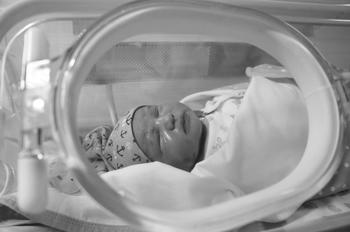New study with senior author Rosemary Higgins, Senior Associate Dean for Research, finds that hydrocortisone is not effective in improving premature infant lung complications.

A drug thought to hold promise for preventing a lung complication in preterm infants appears no more effective than a placebo, suggests a study funded by the National Institutes of Health. Bronchopulmonary dysplasia (BPD) refers to the damage and scarring that may result from immaturity as well as the oxygen and ventilator therapy needed to keep preterm infants alive. In recent years, hydrocortisone was considered as a replacement for the widely used drug dexamethasone in the treatment of BPD. Both drugs inhibit the inflammation thought to contribute to BPD, but previous animal studies suggested that hydrocortisone would have fewer effects on the developing brain.
“In this study, we found that hydrocortisone treatment did not lead to an improvement in infant survival without moderate or severe BPD, nor did hydrocortisone treatment affect outcomes at two years of age,” said Rosemary Higgins, senior associate dean for research in the College of Health and Human Services, who is the senior author. “This is significant because we previously thought the drug might improve infants’ lung complications with fewer side effects, and now we should seek additional ways to treat BPD.”
The research team was led by Kristi L. Watterberg, M.D., of the University of New Mexico Health Sciences Center. The study appears in the New England Journal of Medicine and was funded by the NIH Eunice Kennedy Shriver National Institute of Child Health and Human Development (NICHD) and National Center for Advancing Translational Sciences.
The study enrolled 800 infants born before the 30th week of pregnancy who had been on a ventilator for at least 7 days. From 14 days to 28 days infants were randomly assigned to receive either hydrocortisone or a placebo. Of the hydrocortisone-treated infants, 16.6% survived to 36 weeks without moderate or severe BPD, which did not differ significantly from 13.2% in the placebo group. The rate of neurodevelopmental impairment did not differ significantly between the groups (36.9% vs. 37.3%). The hydrocortisone group was more likely to need drug treatment for hypertension than the placebo group (4.3% vs. 1.0%).
